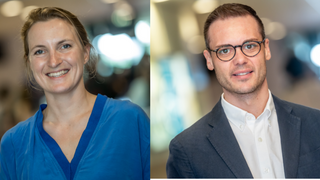“This facility not only accelerates our research but also broadens the application of neuroscience methods within our school, making us a magnet for top talent.” – Ale Smidts, professor of marketing research in RSM’s department of Marketing Management and one of RSM’s lead researchers.
A wide range of researchers can now use the dedicated 3 Tesla MRI scanner facility – located at the Erasmus Medical Center in Rotterdam, the Netherlands – including those from the Erasmus School of Social and Behavioural Sciences (ESSB) and RSM. Researchers can use the scanner for both functional and structural brain research. For example, studying brain activity during cognitive tasks that involve making choices, and analysing brain structure about psychological factors, individual characteristics and skills. Thanks to the cooperation between the various faculties and the Erasmus Medical Center, the dedicated facility makes MRI scans accessible to researchers during regular business hours. This significantly lowers the threshold for conducting neurocognitive studies and strongly increases the research capacity within EUR.
fMRI: exploring the relationship between brain and behaviour
While the structural MRI scanner mainly maps the grey and white matter in the brain, fMRI scans enable researchers to study brain activity during cognitive tasks, such as decision-making. In other words, researchers can observe a brain in real-time to see which areas of the brain are activated during a task and how those areas communicate with each other. This technique stimulates collaboration among disciplines, including business administration, economics, psychology and neuroscience.
According to Dr Maarten Boskem, associate professor of Marketing Management in the department of Marketing Management at RSM, “[The new facility] allows us easy access to the fMRI scanner at our own university, hugely speeding up our research. But more importantly, it provides an impulse for a broader uptake of neuroscience methods at our school and will attract more talented researchers to our university. It is fantastic that the leadership of our school and the university have supported this project.”
Recent RSM studies using brain-scanning research
Research that uses neuroimaging techniques like electroencephalography (EEG) and fMRI has already yielded many impactful results. For example, at the Erasmus Center for Neuroeconomics, led by RSM’s Prof. Smidts and Dr Boksem, studies have explored decision-making processes that have uncovered the neural bases of honest versus dishonest behaviour – insights that resonate with corporate ethics and fraud prevention.
Other research has examined persuasion and influence, which has identified the psychological processes that make certain advertisements or campaigns more effective. Another line of study, neuroforecasting, has demonstrated that brain activity during a movie or song previews can predict market success more accurately than traditional methods.
Investigating societal and business implications
The new dedicated 3 Tesla MRI scanner can support various projects; for example, the consortium Growing Up Together in Society (GUTS), led by Prof. Eveline Crone at ESSB. A project that will make intensive use of the fMRI scanner to investigate how environmental and cognitive factors shape young people's development and societal trust.
Research collaborations like this not only help to deepen our understanding of human behaviour, but they also promote actionable insights for business, public policy and societal well-being.
To discover more about EUR’s new fMRI scanning facility, watch this YouTube video: https://youtu.be/FCZgFnOQkc4.


